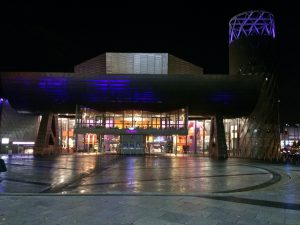Last year’s #DCDC17 conference, hosted by The National Archives and Research Libraries UK (RLUK), was an opportunity to analyse how we assess the value of our collections and partnerships, whilst advancing our digital technologies to enable engagement by communities, researchers and academics.
Professor Geoffrey Crossick (RLUK) gave the opening keynote, suggesting that the cultural value of collections lies in engagement, and that our cultural institutions play an important role in enabling individuals to become reflective and engaged citizens.
My first highlight was a paper by Lucy Crompton-Reid, CEO of Wikimedia who introduced the Art+Feminism edit-a-thon initiative, with the aim of addressing the vast gender gap in the authoring of Wikipedia entries; their partnership with the BBC as part of the 100 women documentary series, sharing the differing life experiences of women around the world in a series of films and podcasts, presented an opportunity to engage women from diverse backgrounds in editing. Wikipedia remains the most frequently used online source of reference information. Currently there are ‘Wikipedians in residence’ at the Bodleian and Wellcome libraries; the National Library of Wales has had a Wikipedian in residence for the longest period (two years), who creates entries in Welsh and English. Due to my background in public and academic libraries, I was keen to hear about the role of the Wikipedians within the library, and their ability to enable women to confidently edit and assess the reliability of sources within the platform. The 1Lib1Ref initiative in partnership with the Chartered Institute of Library & Information Professionals (CILIP), which took place earlier this year, raised awareness in order to improve the reliability of information available in Wikipedia. News editors and mainstream television are also engaged with the initiative and Wikipedia is now embedded in the above libraries’ workflow. Following the paper, I was able to talk with Lucy at the event and arrange to work with her team to plan monthly edit-a-thons for women. The Digital Humanities Lab will be hosting both the launch and workshops in the coming year.
Mike Jackson, Chief Executive of North Somerset Council gave an interesting keynote paper entitled “Weston after Dismaland – Banksy and Beyond”. The presentation gave an insight into how the power of art and a global media event were catalysts for the regeneration of Weston-super-Mare. The project, through the facilitation of arts activity and new partnerships, has forged ahead in making its local college a university campus and facilitating engagement with marginalised community groups, on the back of Banksy’s exhibition. The local authority are working in consultation with designer Wayne Hemingway MBE to ensure that the ongoing work in the community engages young people from arts backgrounds. The presentation was particularly interesting for me, as in my career I worked with young offenders, adolescent mental health patients, and young people from deprived backgrounds to engage them in both historical and arts material available in libraries. I also appreciate the deeper message here, on the importance of diversity and topicality in our cultural heritage material.
New and innovative partnerships fostering engagement in education are of particular interest to me. A presentation from the National Archives and the National Trust, in the panel “Heritage and the human experience: hidden voices, social cohesion and diversity” gave an interesting insight into the use of immersive performances as part of community-led tours, in recreating the 1930s Caravan Club as part of their Queer City project. The session highlighted the value of using experimental methods to increase empathy amongst the groups visiting the venue.
#DCDC17 certainly generated excitement around embedding creative methods for engagement with digital collections internationally, and promoting digital collections as a way to engage audiences in research. Oxford University’s TORCH app was an excellent example of collaboration between developers and the Galleries, Libraries, Archives and Museum sector.
The Lowry was both an inspiring and exciting venue for the event, their team were thorough, helpful and clear in their instructions. I would have welcomed improved accessibility to key areas such as the cloakrooms and some workshops due to a mobility issue, however the venue overall was a good location and the conference certainly made the most of the space on offer.
Attending the #DCDC17 conference was a highly valuable experience, and I look forward to responding to next year’s call for papers with updates on the management of the Digital Humanities Lab and our work with a new team of Digital Humanities Interns.
Keynote presentations are available on the #DCDC17 webpage.
Emma Sherriff, Digital Humanities Technical Manager

